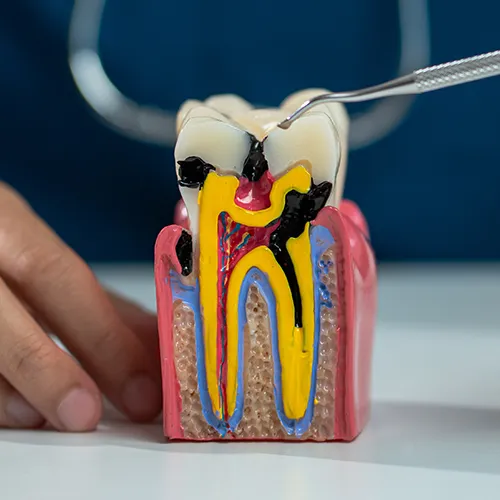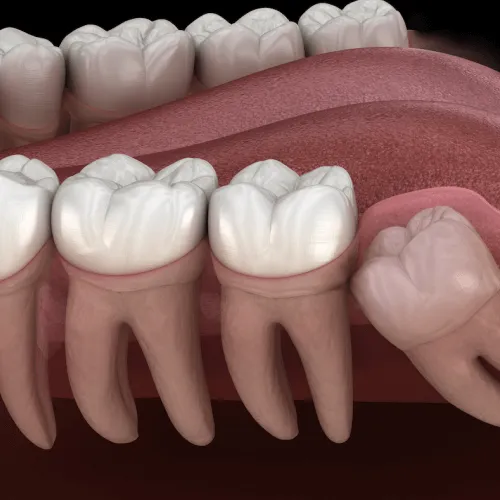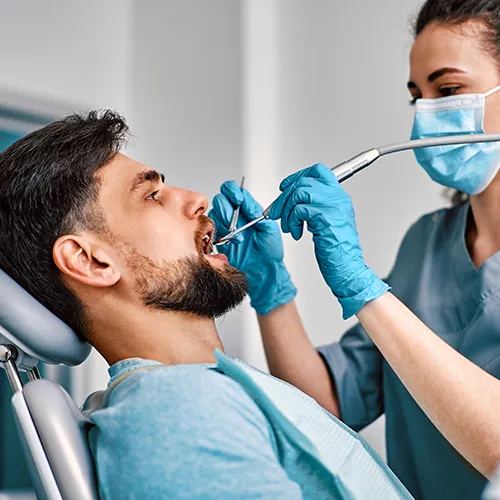Restorative Dentistry, Implant Dentistry
Missing Teeth Can Be More Than a Cosmetic Concern
Missing a tooth, or several? You’re not alone. Millions of adults face tooth loss at some point, whether from injury, decay, or age-related issues. Thankfully, dental implants offer a reliable, long-term solution that doesn’t just replace teeth but restores confidence, comfort, and full function.
Still, if you’re considering implants, you probably have questions. A lot of them. And that’s normal. Let’s walk through everything you should know before taking the next step toward your new smile.
What exactly is a dental implant?
At its core, a dental implant is a small titanium post that replaces the root of a missing tooth. Once the post is placed into your jawbone, it fuses with the bone—a process called osseointegration. After healing, a custom crown is attached to the implant post. The result looks, feels, and functions like a natural tooth.
An implant has three key parts:
- The implant post – surgically placed into the jawbone
- The abutment – connects the post to the crown
- The crown – the visible tooth replacement
Unlike bridges or dentures, implants don’t rely on surrounding teeth or rest on the gums. They’re stable, permanent, and incredibly durable.
How long does a dental implant last?
Let’s start with the question most people ask first. The titanium implant itself can last a lifetime.
This is because titanium is highly biocompatible and integrates with your jawbone, essentially becoming part of your body. With proper care, many patients never need to replace the implant post.
The crown typically lasts 10 to 15 years before it may need replacement due to normal wear and tear. Some last even longer with excellent oral hygiene and regular dental checkups.
Here’s what influences longevity:
- Oral hygiene: Brushing, flossing, and professional cleanings are essential.
- Lifestyle habits: Smoking can significantly reduce implant success. Teeth grinding can also affect the crown’s lifespan.
- Bone health: Sufficient jawbone density and healthy gums contribute to long-term success.
- Professional care: Regular dental visits help catch any issues early.
The bottom line? A well-placed implant with good care can outlive just about any other dental restoration.
What is the cheapest tooth implant?
Let’s be honest—implants aren’t cheap. But they are an investment.
Basic single-tooth implants typically start around $1,500 to $2,500 in the U.S. That’s usually just the implant itself. Once you add the abutment, crown, and any additional procedures (like bone grafting), the total cost often ranges between $3,000 and $5,000 per tooth.
However, this isn’t a one-size-fits-all answer. Your specific cost can depend on:
- Type of implant: Mini implants may cost less but aren’t suitable for everyone.
- Materials used: Premium crowns and abutments come with a higher price tag but also better aesthetics and durability.
- Additional procedures: Tooth extractions, bone grafts, or sinus lifts can add to the cost.
- Geographic location: Prices vary significantly by region and clinic.
- Experience of the dentist: More skilled, highly reviewed providers often charge more (and for good reason).
A word of caution: Some clinics advertise ultra-low prices, but they may cut corners with materials, skip important diagnostic steps, or lack the expertise needed for complex cases. What seems cheap now could cost you a lot in repairs and replacements later.
At Prestige Dental, we never compromise on quality, but we do work with patients to create affordable payment plans and financing options.
How much are full mouth dental implants?
If you need to replace an entire arch—or both arches—you have a few options, each with different price points.
Option 1: Implant-Supported Dentures (All-on-4 or All-on-6)
- Cost: $15,000 to $30,000 per arch
- What’s involved: Four to six implants are placed in the jaw to support a full row of prosthetic teeth. These dentures are fixed, meaning they won’t slip or require adhesives.
Option 2: Full Mouth Individual Implants
- Cost: $40,000 to $90,000+
- What’s involved: Each missing tooth gets its own implant and crown. This option most closely replicates natural teeth in both appearance and function.
Option 3: Implant-Retained Overdentures
- Cost: $10,000 to $20,000 per arch
- What’s involved: Fewer implants anchor a removable denture, improving stability compared to traditional dentures.
Why such a wide range?
Prices vary based on:
- Number of implants required
- Complexity of the case
- Materials chosen for the prosthetic teeth
- Additional procedures (extractions, bone grafts, etc.)
- Whether sedation or anesthesia is needed
While the upfront cost can seem high, many patients find the long-term benefits outweigh the price. Unlike traditional dentures, implants won’t need frequent adjustments or replacements and won’t cause the jawbone deterioration that often comes with missing teeth.
Are dental implants worth the investment?
It’s not just about aesthetics, though getting your confident smile back is a big perk. Dental implants also:
- Preserve your jawbone: Preventing the bone shrinkage that happens when teeth are missing.
- Support facial structure: Avoiding that "sunken in" look over time.
- Improve function: Eat what you want without worrying about loose dentures.
- Require minimal maintenance: Brush, floss, and visit the dentist as you normally would.
- Last longer: Reducing long-term costs associated with bridges or dentures.
Many patients also report improved speech and better overall oral health, since implants don’t damage neighboring teeth like bridges can.
What is the process of getting dental implants?
Curious what to expect if you decide to move forward?
- Consultation and Planning: We assess your oral health, take X-rays or 3D scans, and discuss your goals. We’ll also determine if you need any preparatory procedures, like bone grafting.
- Implant Placement: The titanium post is surgically placed into your jawbone. Don’t worry—this procedure is usually easier than patients expect, and we ensure you’re comfortable throughout.
- Healing and Osseointegration: This phase can take several months as your bone fuses with the implant.
- Abutment Placement: Once healing is complete, we attach the abutment to the implant.
- Crown Placement: Finally, a custom-made crown is placed, restoring the visible part of the tooth.
The result? A replacement tooth so natural, even you might forget which one it is.
Do dental implants hurt?
This is another common concern.
Most patients report minimal discomfort during and after the implant procedure, often less than they expected. Local anesthesia is used during surgery, and over-the-counter pain relievers usually manage any post-op soreness.
Patients are often surprised by how smooth the process feels compared to other dental procedures like extractions or root canals.
What if I’m not a candidate for implants?
If you’ve been told you’re not a candidate—because of bone loss, gum disease, or other factors—don’t give up. Advances in implant dentistry now allow many people who were once considered unsuitable to successfully receive implants.
Solutions may include:
- Bone grafting
- Sinus lifts
- Using mini implants
- Choosing alternative implant-supported prosthetics
At Prestige Dental, we’ll evaluate your situation and explore all options before ruling anything out.
Take the next step toward a confident, complete smile
Dental implants offer more than just a cosmetic fix. They give you back full function, restore self-esteem, and prevent long-term oral health issues. If you’ve been considering implants—or if you just want to learn more—we invite you to schedule a consultation.
Let’s talk about your goals and create a treatment plan that works for you. Your journey to a lasting, beautiful smile starts with one simple step.
















